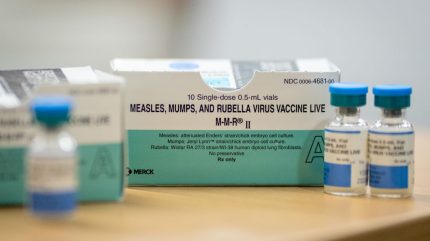
US health secretary Robert F Kennedy Jr has made his most direct endorsement to date of the measles, mumps, and rubella (MMR) vaccine, stating on 6 April that “the most effective way to prevent the spread of measles is the MMR vaccine,” in a post on X.
The remarks follow the second confirmed death of a child during a measles outbreak in Texas, US.

Discover B2B Marketing That Performs
Combine business intelligence and editorial excellence to reach engaged professionals across 36 leading media platforms.
Kennedy has long cast doubt on vaccine safety and had previously avoided recommending the MMR vaccine, even after the death of a child from measles in February. At that time, he hinted at the importance of vaccination, but did not fully endorse it. “The decision to vaccinate is a personal one,” Kennedy wrote in a statement.
The first death occurred in Gaines County, Texas, where the vaccination rate stands at around 82%. This is below the 95% threshold that the World Health Organization (WHO) says is necessary to prevent community spread.
On 3 April, the Texas Department of State Health Services reported that a second child – school-aged, unvaccinated, and with no underlying health conditions – died of pulmonary complications related to measles. As of 6 April, Kennedy confirmed 642 measles cases across 22 states, 499 of which are in Texas.
The measles outbreak is occurring amidst significant cuts to the Department of Health and Human Services, and the Centers for Disease Control and Prevention (CDC), agencies responsible for immunization efforts, disease surveillance, education initiatives, and more. Last week, the White House revealed plans to cut around 10,000 employees from HHS departments, including the FDA, CDC, and the National Institutes of Health (NIH).

US Tariffs are shifting - will you react or anticipate?
Don’t let policy changes catch you off guard. Stay proactive with real-time data and expert analysis.
By GlobalDataKatarina Zahedi, Pharma analyst at GlobalData explained that the Trump administration has asked the CDC to cut its budget by $2.9bn – roughly 35%. This could potentially divert resources away from essential health programmes.
“The uncertainty surrounding the CDC’s restructuring proposals raises concerns about the agency’s ability to respond effectively to public health needs,” said Zahedi.
Measles was declared eliminated in the US in 2000, but declining vaccine uptake has enabled wider outbreaks in recent years. Cases typically begin with an individual who contracts the virus abroad and then spreads it in under-vaccinated communities.
The US Food and Drug Administration (FDA) approved MMR vaccine in the US is MSD’s M-M-R II. It is highly effective, with a single dose providing approximately 93% protection against measles with two doses increasing effectiveness to about 97%. The US childhood immunisation schedule – as recommended by the CDC, calls for the first dose of the MMR vaccine at 12 to 15 months of age and a second dose at four to six years, prior to school entry.
In February 2025, a study published in the American Journal of Public Health found that only 71.8% of US parents reported that their children received at least one dose of the MMR vaccine. This data was collected from 20,000 surveyed parents of children under five from July 2023 to April 2024.
While he acknowledged the MMR vaccine as the most effective preventative measure, Kennedy continues to promote unproven therapies. On the same day as his pro-vaccine statement, he posted on X about visiting two physicians who claimed to have treated 300 measles cases among Mennonite children using aerosolised budesonide and the antibiotic clarithromycin. These treatments are not approved to treat measles, and their efficacy is unproven.
In an 18 March comment, Amy Edwards, a paediatric infectious diseases specialist at Case Western Reserve University said: “I’m not aware of any papers that show that supportive therapy with inhaled steroids would be beneficial in somebody with measles.”
GlobalData is the parent company of Pharmaceutical Technology.


